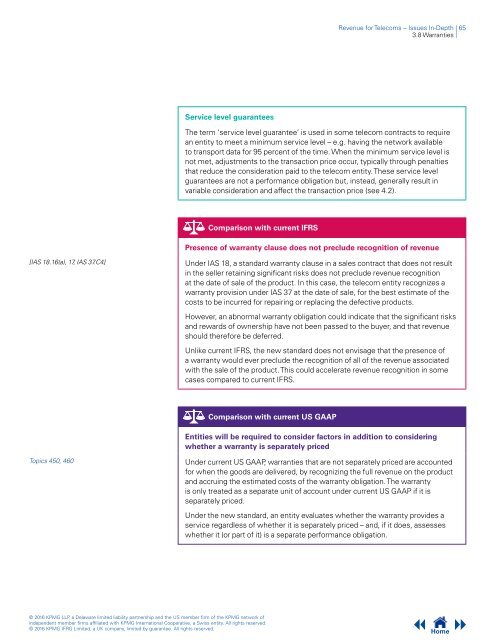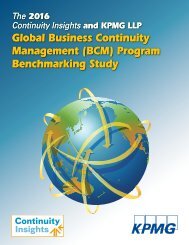Revenue for Telecoms
2cdncba
2cdncba
You also want an ePaper? Increase the reach of your titles
YUMPU automatically turns print PDFs into web optimized ePapers that Google loves.
<strong>Revenue</strong> <strong>for</strong> <strong>Telecoms</strong> – Issues In-Depth | 65<br />
3.8 Warranties |<br />
Service level guarantees<br />
The term ‘service level guarantee’ is used in some telecom contracts to require<br />
an entity to meet a minimum service level – e.g. having the network available<br />
to transport data <strong>for</strong> 95 percent of the time. When the minimum service level is<br />
not met, adjustments to the transaction price occur, typically through penalties<br />
that reduce the consideration paid to the telecom entity. These service level<br />
guarantees are not a per<strong>for</strong>mance obligation but, instead, generally result in<br />
variable consideration and affect the transaction price (see 4.2).<br />
Comparison with current IFRS<br />
Presence of warranty clause does not preclude recognition of revenue<br />
[IAS 18.16(a), 17, IAS 37.C4]<br />
Under IAS 18, a standard warranty clause in a sales contract that does not result<br />
in the seller retaining significant risks does not preclude revenue recognition<br />
at the date of sale of the product. In this case, the telecom entity recognizes a<br />
warranty provision under IAS 37 at the date of sale, <strong>for</strong> the best estimate of the<br />
costs to be incurred <strong>for</strong> repairing or replacing the defective products.<br />
However, an abnormal warranty obligation could indicate that the significant risks<br />
and rewards of ownership have not been passed to the buyer, and that revenue<br />
should there<strong>for</strong>e be deferred.<br />
Unlike current IFRS, the new standard does not envisage that the presence of<br />
a warranty would ever preclude the recognition of all of the revenue associated<br />
with the sale of the product. This could accelerate revenue recognition in some<br />
cases compared to current IFRS.<br />
Comparison with current US GAAP<br />
Entities will be required to consider factors in addition to considering<br />
whether a warranty is separately priced<br />
Topics 450, 460<br />
Under current US GAAP, warranties that are not separately priced are accounted<br />
<strong>for</strong> when the goods are delivered, by recognizing the full revenue on the product<br />
and accruing the estimated costs of the warranty obligation. The warranty<br />
is only treated as a separate unit of account under current US GAAP if it is<br />
separately priced.<br />
Under the new standard, an entity evaluates whether the warranty provides a<br />
service regardless of whether it is separately priced – and, if it does, assesses<br />
whether it (or part of it) is a separate per<strong>for</strong>mance obligation.<br />
© 2016 KPMG LLP, a Delaware limited liability partnership and the US member firm of the KPMG network of<br />
independent member firms affiliated with KPMG International Cooperative, a Swiss entity. All rights reserved.<br />
© 2016 KPMG IFRG Limited, a UK company, limited by guarantee. All rights reserved.<br />
Home







